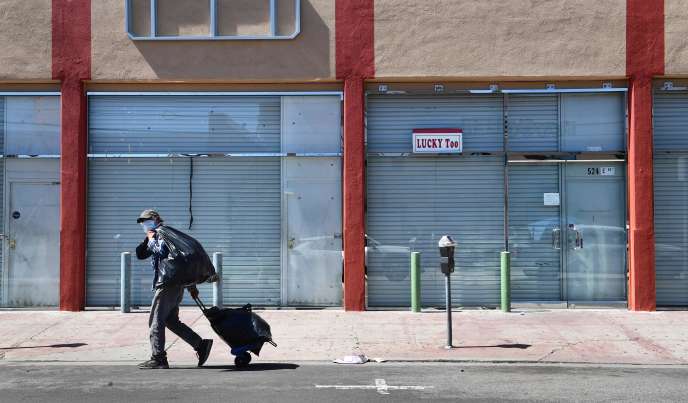
The economic news is terrible, but America wants to believe that it will emerge from the recession caused by the coronavirus epidemic. This is the sentiment of Wall Street, which ended the trading session of Wednesday April 29 with fanfare, with a rise in the Dow Jones of 2.3% (the decline since 1er January was only 14%) while the Nasdaq (+ 3.6%), the index rich in technological values, returned to its level at the start of the year.
However, the recession is severe, with a fall in gross domestic product (GDP) of 4.8% in the first quarter, announced Wednesday by the Commerce Department, while America did not stop until the beginning March in California and mid-March in New York.
Consumption of goods fell 7.6%, with a sharp decline in the automotive sector. The closure of restaurants and all cultural and sporting activities resulted in a 10% drop in service spending, while investment fell 5.6% year on year.
Radical measures
This is the largest decline since the recession of 2008, and the second quarter looks terrible, the worst ever recorded according to the president of the Federal Reserve (Fed, central bank), Jerome Powell: the budget department of the Congress (CBO) expects a drop of around 40% in economic activity. For the whole year, the International Monetary Fund (IMF) forecasts a contraction of the economy by 5.7%, while more than 26 million Americans (out of a working population of 165 million) have registered unemployed during the first month of the crisis.
But the news is so bad that the United States is taking drastic action. The Fed, which had cut its key rates twice, now between 0% and 0.25%, intends to continue distributing money for free. And it supports the economy at arm's length, by massively buying debt issued by businesses and local communities. Since mid-March, it has acquired more than $ 2 trillion (1,840 billion euros) in securities, equivalent to 10% of US GDP.

Powell intends to continue this policy until America is back on the road to full employment. "We are in no rush to remove these measures"said the president of the central bank on Wednesday, adding that he had no financial limits to buy the securities. These words are somewhat equivalent to the promise made in July 2012 by the former boss of the European Central Bank (ECB) Mario Draghi, to ensure " whatever happens " the survival of the euro. This policy encourages commercial bankers to lend to their clients, knowing that the Fed will buy back the securities issued.
You have 54.61% of this article to read. The suite is reserved for subscribers.




